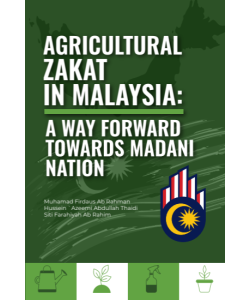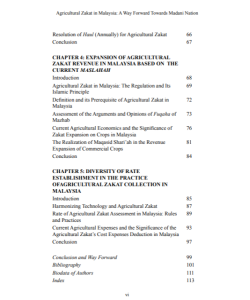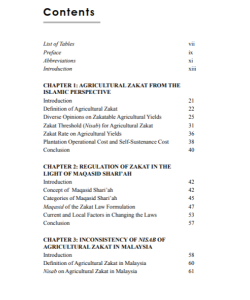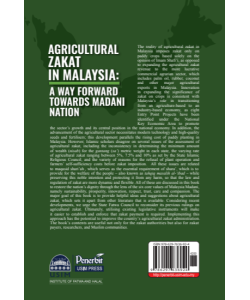Juga boleh dibeli melalui / Also available for purchase at:
Shopee - Kota Buku - MySiswaPlace
Authors: Muhamad Firdaus Ab Rahman, Hussein `Azeemi Abdullah Thaidi, Siti Farahiyah Ab Rahim
ISBN: 9786297636924
Publication Year: 2024
Price: RM 42.00
Pages: 110 pp.
The reality of agricultural zakat in Malaysia imposes zakat only on paddy crops based solely on the opinion of Imam Shafi’i, as opposed to expanding the agricultural zakat revenue to the more lucrative commercial agrarian sector, which includes palm oil, rubber, coconut and other major agricultural exports in Malaysia.
Innovation in expanding the significance of zakat on crops is consistent with Malaysia’s role in transitioning from an agriculture-based to an industry-based economy, as eight Entry Point Projects have been identified under the National Key Economic Area to promote the sector’s growth and its central position in the national economy.
In addition, the advancement of the agricultural sector necessitates modern technology and high-quality seeds and fertilisers; this development parallels the rising cost of paddy planting in Malaysia.
However, Islamic scholars disagree on several issues of the assessment of agricultural zakat, including the inconsistency in determining the minimum amount of wealth (nisab) for the gantang (sa’) metric weight in each state, the varying rate of agricultural zakat ranging between 5%, 7.5% and 10% as set by the State Islamic Religious Council, and the variety of reasons for the refusal of plant operation and farmers’ self-sufficiency costs before zakat imposition.
All these issues are related to maqasid shari’ah , which serves as the essential requirement of shara’, which is to provide for the welfare of the people – also known as tahqiq masalih al-’ibad – while preserving this noble intention and protecting it from any harm, so that the law and regulation of zakat are more dynamic and flexible.
All of these are discussed in this book to restore the nation’s dignity through the lens of the six core values of Malaysia Madani, namely sustainability, prosperity, innovation, respect, trust, care and compassion. The major goal of this book is to provide helpful ideas and suggestions about agricultural zakat, which sets it apart from other literature that is available.
Considering recent developments, we urge the State Fatwa Council to reconsider its previous rulings on agricultural zakat. Ultimately, utilising existing legislative instruments will make it easier to establish and enforce that zakat payment is required.
Implementing this approach has the potential to improve the country’s agricultural zakat administration. The book’s contents are useful not only for the zakat authorities but also for zakat payers, researchers, and Muslim communities.
AGRICULTURAL ZAKAT IN MALAYSIA: A WAY FORWARD TOWARDS MADANI NATION
- Jenama: Penerbit USIM
- Kod Produk: 9786297636924
- Kewujudan: 1
-
RM42.00
Tags: Muhamad Firdaus Ab Rahman, Hussein 'Azeemi Abdullah Thaidi, Siti Farahiyah Ab Rahim, FSU, 2024




